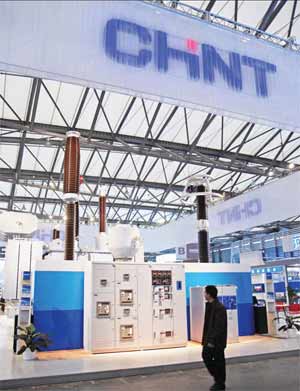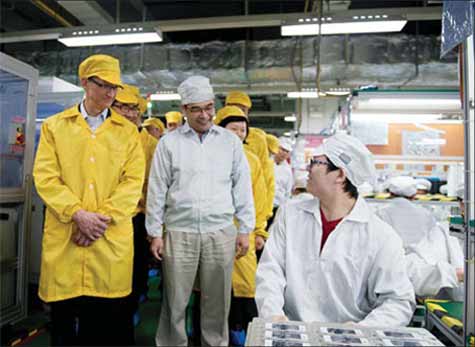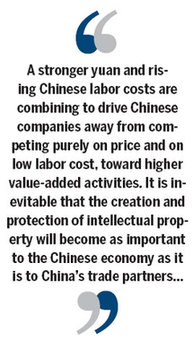Protection plus
| Foreign and Chinese firms robustly protect their intellectual property rights |
|
Righting the wrongs of patent rights Improved grounds for IPR in China aid foreign, local firms Protecting intellectual property rights has been the single biggest hurdle for most companies to overcome when entering the Chinese market. But as the number of IPR cases being filed, including against Western companies, is growing steadily in China, it shows that the world's second-largest economy is becoming more serious about protecting valuable ideas. The growing number of foreign companies appearing in the Chinese courts for IPR violations are also a clear indication that China is making rapid strides up the innovation ladder. With more patent filings than any Western nation, China is no longer just a factory, but rather a destination where ideas are given shape and incubated into successful global enterprises. Rising domestic IPR awareness, the influence of foreign companies tightening their IPR framework, or even suggestions that they have been exploiting loopholes are often cited by experts for the tightening of the IPR system in China. According to the Supreme People's Court, judges nationwide announced verdicts in 24,544 IPR cases during the first five months of this year, with 2 percent, or 504 lawsuits, involving overseas litigants. Most of the overseas litigants were from the United States, European countries and Japan, says Kong Xiangjun, president of the top court's intellectual property tribunal. Fierce competition, as well as a tendency for trade protectionism in certain countries, have led to a remarkable increase in cross-border IPR conflicts, he says, adding that most of the IPR lawsuits involving overseas companies concern infringement of trademarks, patents or copyrights. Rising awareness of IPR protection among IT companies, and intensified efforts of judicial departments to combat copyright infringement have also contributed to the high incidence of such cases, Kong says. Multinational giants such as Microsoft, Apple, General Electric, Abbott Laboratories, Michelin, BMW and Honda are among the big ticket IPR litigants in China in recent years. Increasing number of recent cases have put foreign companies in the defendant's seat.
In 2009, French electrical company Schneider Electric agreed to pay $23 million (17 million euros) to the Zhejiang-based Chint Group as settlement to end a three-year patent lawsuit. The French company was accused of violating Chint's rights by selling five models of apparatus, which fell within the protected scope of Chint's patent rights. Chint's success spurred several Chinese enterprises to pay closer attention to IPR protection and use legal actions for protection. Tech giant Apple Inc was the focal point of several IPR disputes last year. In the first instance, a Shenzhen court found the US company guilty of violating the iPad trademark in the Chinese market. The trademark was registered by a local company Proview Technology and Apple was forced to pay $60 million to get control. The second case involving Apple was brought up by Shanghai-based Zhizhen Network Technology Co, which accused the California-based company of infringing its patent for Xiao i Robot, claiming it was used in Apple's intelligent digital assistant Siri. At the second hearing of the case earlier this month, Apple rejected Zhizhen's accusation and refused to compare the two technologies for appraisal, saying the results would be pending on the State Intellectual Property Office's decision on its application for invalidation of Xiao i Robot's patent. Chen from Jones Day feels that the implementation of the "national intellectual property strategy" since 2006 has been the main reason why foreign companies are facing many IPR challenges in China. "The government has provided policy support in areas such as fiscal incentives and tax reduction to encourage patent filings, and this has led to double-digit growth in patent applications over the past seven years," he says. According to the State Intellectual Property Office, China received more than 1 million patent applications in the first half of this year, up 18 percent year-on-year. China also awarded the most patents last year, even more than the combined amount filed by the next four nations, Chen says.
"Every April, national and local governments put out new reports of double-digit patent filing growth over the past year. Does this mean China's innovation activities surpass the combined activities in the next four countries?" Regardless of their correlation to innovation, more patent rights also mean more reasons to sue competitors. The Chinese patent office issued more than 1 million patents in 2012, most to domestic parties. Most of the IPR lawsuits are generally a result of rising awareness by Chinese companies of IPR protection, and Chinese IPR owners have also learned from examples in the US about going after companies with deep pockets, Chen says. Dan Harris, founding member of Asia-focused commercial law firm, Harris & Moure, based in Seattle, says Chinese courts are starting to get tougher on IPR violations, and while that is a good thing, particularly with respect to trademarks, the courts also need to be tougher in enforcing them. "A lot of times foreign companies complain about IPR in China, when in reality it was the foreign company that made the mistake when it went to China of not sufficiently protecting its rights." Harris says China is a lot better now compared with a decade ago, because the country is getting wealthier, and because Chinese companies are starting to become more conscious about IPR. [Full story] |
|
| Related readings | |
|
US companies seek tougher enforcement of IP laws |
SPP calls for cooperation on IPR cases |
|
|







